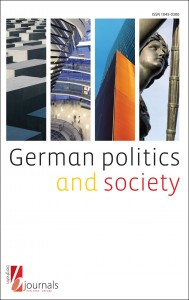
We are delighted to inform you that we will be attending fortieth annual German Studies Association conference in San Diego, CA on Sept. 29-Oct. 2, 2016. Please stop by our stand to browse our latest selection of books at discounted prices & pick up some free journal samples.
We are especially happy to invite you to join Berghahn on Friday September 30th at 5:30pm in the exhibit hall for a wine reception to be held at Berghahn booth to celebrate some of our newly published titles. We hope to see you there!
If you are unable to attend, we would like to provide you with a special discount offer. For the next 30 days, receive a 25% discount on all German Studies titles found on our website. At checkout, simply enter the discount code GSA16. Browse our new 2016-17 German Studies Catalog online or visit our website for a complete listing of all published and forthcoming titles.
Below is a preview of some of our newest releases on display:
 THE DEVIL’S WHEELS
THE DEVIL’S WHEELS
Men and Motorcycling in the Weimar Republic
Sasha Disko
Volume 2, Explorations in Mobility
During the high days of modernization fever, among the many disorienting changes Germans experienced in the Weimar Republic was an unprecedented mingling of consumption and identity: increasingly, what one bought signaled who one was. Exemplary of this volatile dynamic was the era’s burgeoning motorcycle culture. With automobiles largely a luxury of the upper classes, motorcycles complexly symbolized masculinity and freedom, embodying a widespread desire to embrace progress as well as profound anxieties over the course of social transformation. Through its richly textured account of the motorcycle as both icon and commodity, The Devil’s Wheels teases out the intricacies of gender and class in the Weimar years.
Read Introduction: Does the man make the motorcycle or the motorcycle the man?
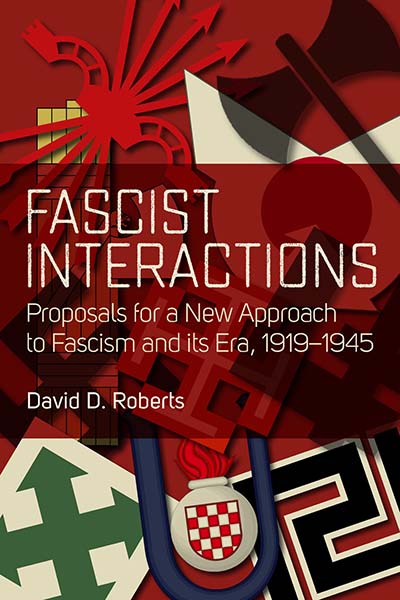 FASCIST INTERACTIONS
FASCIST INTERACTIONS
Proposals for a New Approach to Fascism and Its Era, 1919-1945
David D. Roberts
Although studies of fascism have constituted one of the most fertile areas of historical inquiry in recent decades, more and more scholars have called for a new agenda with more research beyond Italy and Germany, less preoccupation with definition and classification, and more sustained focus on the relationships among different fascist formations before 1945. Starting from a critical assessment of these imperatives, this rigorous volume charts a historiographical path that transcends rigid distinctions while still developing meaningful criteria of differentiation. Even as we take fascism seriously as a political phenomenon, such an approach allows us to better understand its distinctive contradictions and historical variations.
Read Preface
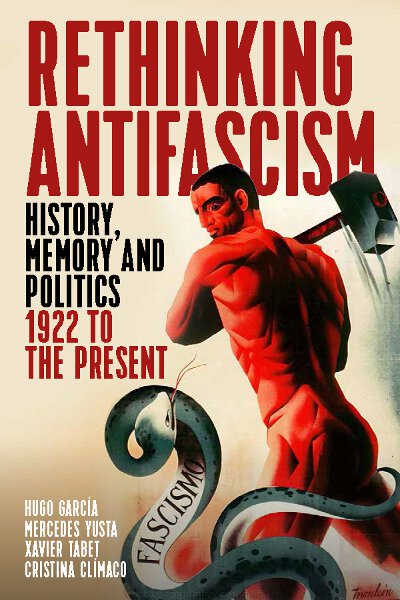 RETHINKING ANTIFASCISM
RETHINKING ANTIFASCISM
History, Memory and Politics, 1922 to the Present
Edited by Hugo García, Mercedes Yusta, Xavier Tabet, and Cristina Clímaco
Bringing together leading scholars from a range of nations, Rethinking Antifascism provides a fascinating exploration of one of the most vibrant sub-disciplines within recent historiography. Through case studies that exemplify the field’s breadth and sophistication, it examines antifascism in two distinct realms: after surveying the movement’s remarkable diversity across nations and political cultures up to 1945, the volume assesses its postwar political and ideological salience, from its incorporation into Soviet state doctrine to its radical questioning by historians and politicians. Avoiding both heroic narratives and reflexive revisionism, these contributions offer nuanced perspectives on a movement that helped to shape the postwar world.
Read Introduction: Beyond Revisionism: Rethinking Antifascism in the Twenty-First Century
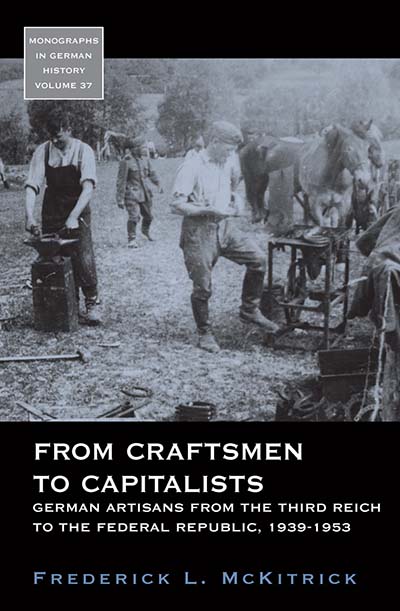 FROM CRAFTSMEN TO CAPITALISTS
FROM CRAFTSMEN TO CAPITALISTS
German Artisans from the Third Reich to the Federal Republic, 1939-1953
Frederick L. McKitrick
Volume 37, Monographs in German History
Politically adrift, alienated from Weimar society, and fearful of competition from industrial elites and the working class alike, the independent artisans of interwar Germany were a particularly receptive audience for National Socialist ideology. As Hitler consolidated power, they emerged as an important Nazi constituency, drawn by the party’s rejection of both capitalism and Bolshevism. Yet, in the years after 1945, the artisan class became one of the pillars of postwar stability, thoroughly integrated into German society. From Craftsmen to Capitalists gives the first account of this astonishing transformation, exploring how skilled tradesmen recast their historical traditions and forged alliances with former antagonists to help realize German democratization and recovery.
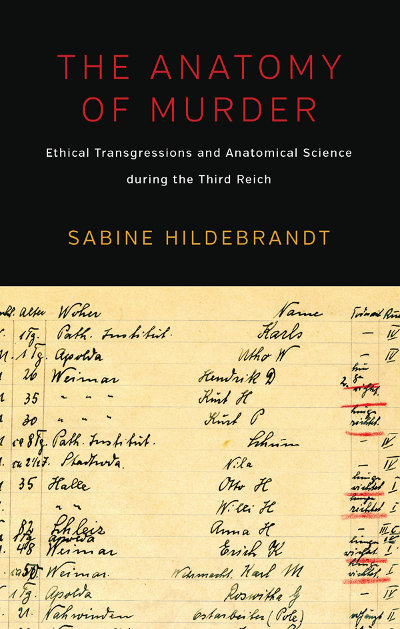 THE ANATOMY OF MURDER
THE ANATOMY OF MURDER
Ethical Transgressions and Anatomical Science during the Third Reich
Sabine Hildebrandt
Foreword by William E. Seidelman
Of the many medical specializations to transform themselves during the rise of National Socialism, anatomy has received relatively little attention from historians. While politics and racial laws drove many anatomists from the profession, most who remained joined the Nazi party, and some helped to develop the scientific basis for its racialist dogma. As historian and anatomist Sabine Hildebrandt reveals, however, their complicity with the Nazi state went beyond the merely ideological. They progressed through gradual stages of ethical transgression, turning increasingly to victims of the regime for body procurement, as the traditional model of working with bodies of the deceased gave way, in some cases, to a new paradigm of experimentation with the “future dead.”
Read Introduction
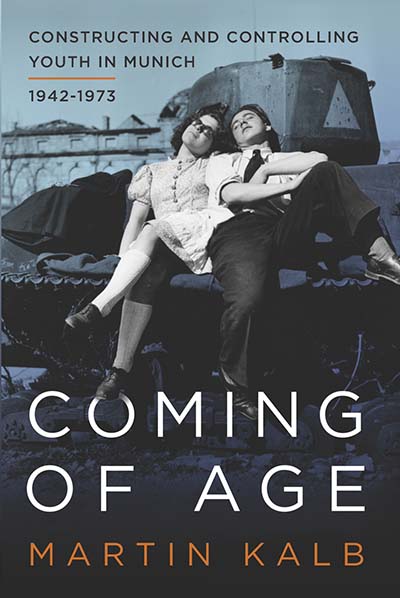 COMING OF AGE
COMING OF AGE
Constructing and Controlling Youth in Munich, 1942-1973
Martin Kalb
In the lean and anxious years following World War II, Munich society became obsessed with the moral condition of its youth. Initially born of the economic and social disruption of the war years, a preoccupation with juvenile delinquency progressed into a full-blown panic over the hypothetical threat that young men and women posed to postwar stability. As Martin Kalb shows in this fascinating study, constructs like the rowdy young boy and the sexually deviant girl served as proxies for the diffuse fears of adult society, while allowing authorities ranging from local institutions to the U.S. military government to strengthen forms of social control.
Read Introduction
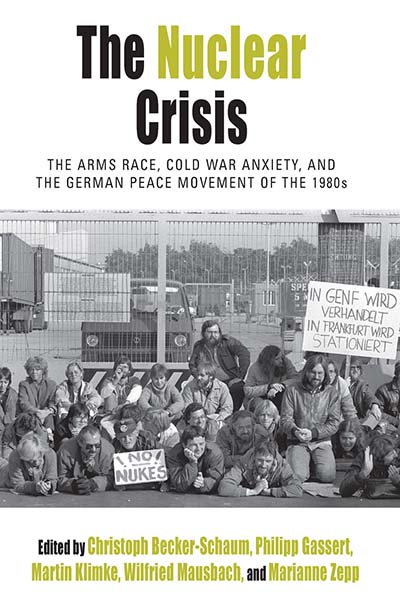 THE NUCLEAR CRISIS
THE NUCLEAR CRISIS
The Arms Race, Cold War Anxiety, and the German Peace Movement of the 1980s
Edited by Christoph Becker-Schaum, Philipp Gassert, Wilfried Mausbach, Martin Klimke, and Marianne Zepp
Volume 19, Protest, Culture & Society
In 1983, more than one million Germans joined together to protest NATO’s deployment of nuclear missiles in Europe. International media overflowed with images of marches, rallies, and human chains as protesters blockaded depots and agitated for disarmament. Though they failed to halt the deployment, the episode was a decisive one for German society, revealing deep divisions in the nation’s political culture while continuing to mobilize activists. This volume provides a comprehensive reference work on the “Euromissiles” crisis as experienced by its various protagonists, analyzing NATO’s diplomatic and military maneuvering and tracing the political, cultural, and moral discourses that surrounded the missiles’ deployment in East and West Germany.
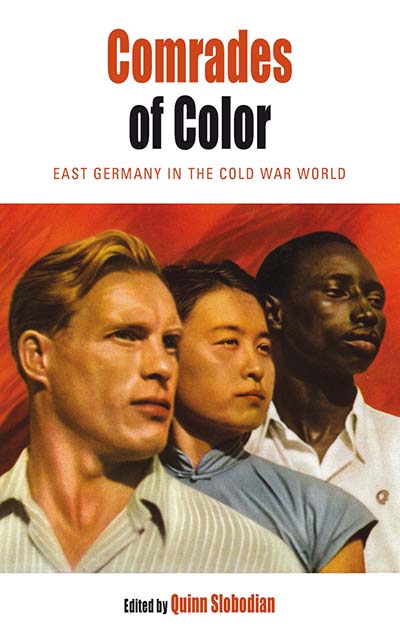 COMRADES OF COLOR
COMRADES OF COLOR
East Germany in the Cold War World
Edited by Quinn Slobodian
Volume 15, Protest, Culture & Society
In keeping with the tenets of socialist internationalism, the political culture of the German Democratic Republic strongly emphasized solidarity with the non-white world: children sent telegrams to Angela Davis in prison, workers made contributions from their wages to relief efforts in Vietnam and Angola, and the deaths of Patrice Lumumba, Ho Chi Minh, and Martin Luther King, Jr. inspired public memorials. Despite their prominence, however, scholars have rarely examined such displays in detail. Through a series of illuminating historical investigations, this volume deploys archival research, ethnography, and a variety of other interdisciplinary tools to explore the rhetoric and reality of East German internationalism.
Read Introduction
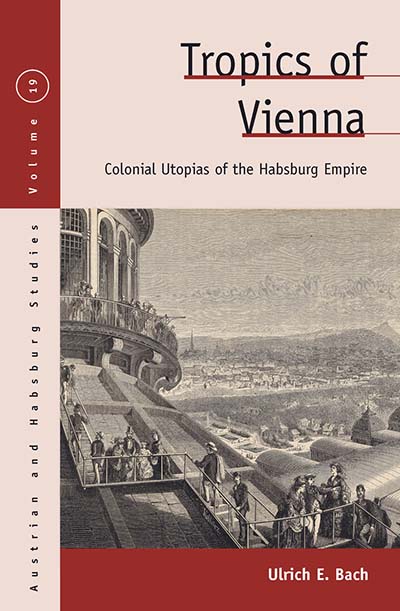 TROPICS OF VIENNA
TROPICS OF VIENNA
Colonial Utopias of the Habsburg Empire
Ulrich E. Bach
Volume 19, Austrian and Habsburg Studies
The Austrian Empire was not a colonial power in the sense that fellow actors like 19th-century England and France were. It nevertheless oversaw a multinational federation where the capital of Vienna was unmistakably linked with its eastern periphery in a quasi-colonial arrangement that inevitably shaped the cultural and intellectual life of the Habsburg Empire. This was particularly evident in the era’s colonial utopian writing, and Tropics of Vienna blends literary criticism, cultural theory, and historical analysis to illuminate this curious genre. By analyzing the works of Leopold von Sacher-Masoch, Theodor Herzl, Joseph Roth, and other representative Austrian writers, it reveals a shared longing for alternative social and spatial configurations beyond the concept of the “nation-state” prevalent at the time.
Read Introdcution
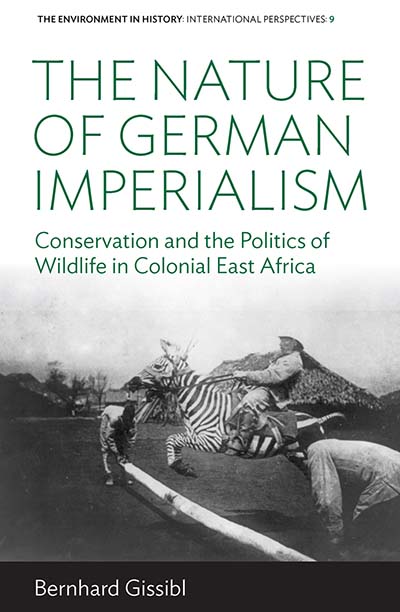 THE NATURE OF GERMAN IMPERIALISM
THE NATURE OF GERMAN IMPERIALISM
Conservation and the Politics of Wildlife in Colonial East Africa
Bernhard Gissibl
Volume 9, Environment in History: International Perspectives
Today, the East African state of Tanzania is renowned for wildlife preserves such as the Serengeti National Park, the Ngorongoro Conservation Area, and the Selous Game Reserve. Yet few know that most of these initiatives emerged from decades of German colonial rule. This book gives the first full account of Tanzanian wildlife conservation up until World War I, focusing upon elephant hunting and the ivory trade as vital factors in a shift from exploitation to preservation that increasingly excluded indigenous Africans. Analyzing the formative interactions between colonial governance and the natural world, The Nature of German Imperialism situates East African wildlife policies within the global emergence of conservationist sensibilities around 1900.
Read Introduction: Doorsteps in Paradise
NEW IN PAPERBACK
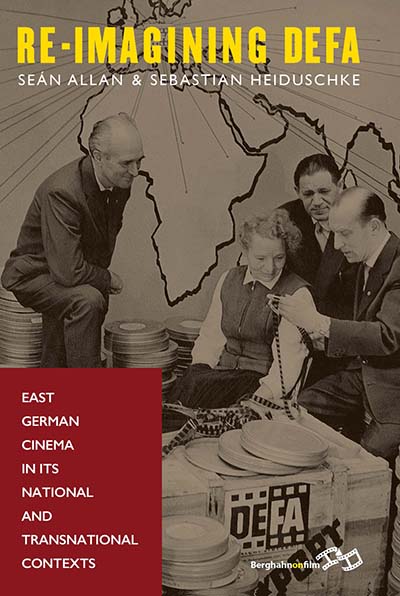 Paperback Original
Paperback Original
RE-IMAGINING DEFA
East German Cinema in its National and Transnational Contexts
Edited by Seán Allan and Sebastian Heiduschke
“Looking back from what is now 25 years after reunification, this fine and original collection of essays represents a new phase in scholarship on East German films and filmmakers, one that builds on the achievements of past research while asking valuable new questions.” · Brad Prager, University of Missouri
By the time the Berlin Wall collapsed, the cinema of the German Democratic Republic—to the extent it was considered at all—was widely regarded as a footnote to European film history, with little of enduring value. Since then, interest in East German cinema has exploded, inspiring innumerable festivals, books, and exhibits on the GDR’s rich and varied filmic output. In Re-Imagining DEFA, leading international experts take stock of this vibrant landscape and plot an ambitious course for future research, one that considers other cinematic traditions, brings genre and popular works into the fold, and encompasses DEFA’s complex post-unification “afterlife.”
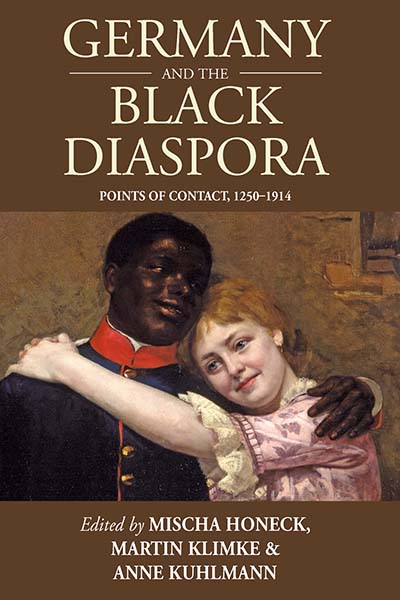 GERMANY AND THE BLACK DIASPORA
GERMANY AND THE BLACK DIASPORA
Points of Contact, 1250-1914
Edited by Mischa Honeck, Martin Klimke, and Anne Kuhlmann
Volume 15, Studies in German History
“In this exciting volume, Honeck, Klimke, and Kuhlmann put forward a unique resource for the burgeoning study of the African diaspora in Germany. Comprising essaysf rom scholars working in a variety of fields, the collection fills significant gaps in the current scholarship… In detailing a phenomenon long ignored within mainstream German culture and history, this collection will be of use to a variety of readers, including those working in African and African American studies, art history, German studies, and history…Highly recommended.” · Choice
his volume presents intersections of Black and German history over eight centuries while mapping continuities and ruptures in Germans’ perceptions of Blacks. Juxtaposing these intersections demonstrates that negative German perceptions of Blackness proceeded from nineteenth-century racial theories, and that earlier constructions of “race” were far more differentiated.
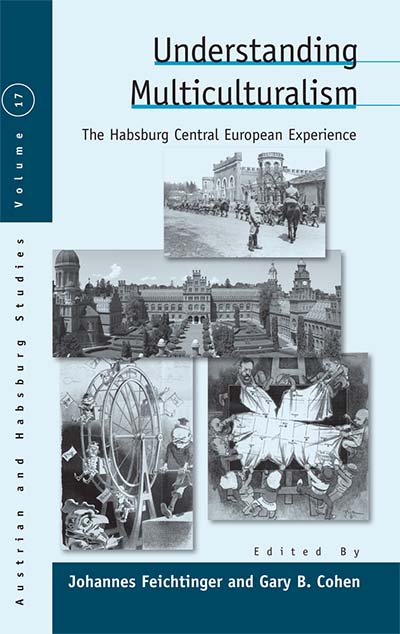 UNDERSTANDING MULTICULTURALISM
UNDERSTANDING MULTICULTURALISM
The Habsburg Central European Experience
Edited by Johannes Feichtinger and Gary B. Cohen
Volume 17, Austrian and Habsburg Studies
“Conceptually complicated and with wide-ranging empirical investigations, this volume is most likely to appeal to readers with some prior exposure to Central European history and theoretical approaches to nationalism. They will find in it plentiful food for thought.” · The American Historical Review
The essays in this collection offer a nuanced analysis of the multifaceted cultural experience of Central Europe under the late Habsburg monarchy and beyond. The authors examine how culturally coded social spaces can be described and understood historically without adopting categories formerly employed to justify the definition and separation of groups into nations, ethnicities, or homogeneous cultures.
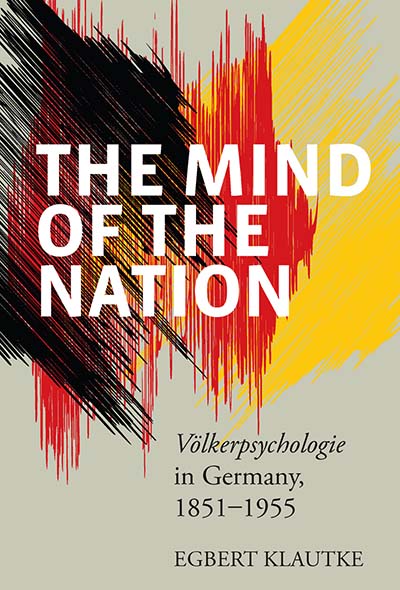 THE MIND OF THE NATION
THE MIND OF THE NATION
Völkerpsychologie in Germany, 1851-1955
Egbert Klautke
“Klautke charts the historical and systematic differences between the concepts of Völkerpsychologie over a century in a book of fewer than 200 pages. Readers will consult with profit this short, but important history of ideas, science, and culture, which deals with the arguments and topics relating to Völkerpsychologie.” · German Historical Institute London Bulletin
This book follows the invention of the discipline in the nineteenth century, its rise around the turn of the century and its ultimate demise after the Second World War. In addition, it shows that despite the repudiation of “folk psychology” and its failed institutionalization, the discipline remains relevant as a precursor of contemporary studies of “national identity.”
Read Introduction: Völkerpsychologie in Germany
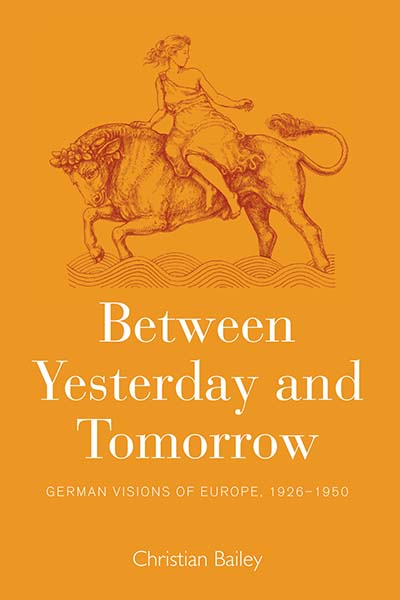 BETWEEN YESTERDAY AND TOMORROW
BETWEEN YESTERDAY AND TOMORROW
German Visions of Europe, 1926-1950
Christian Bailey
“Bailey’s approach adds a thorough analysis of journals, clubs, and organizations that functioned as important intermediaries between the private and public spheres…his refreshing, well-written, and convincingly argued intellectual history complements traditional historiography.” · Choice
An intellectual and cultural history of mid-twentieth century plans for European integration, this book calls into question the usual pre- and post-war periodizations that have structured approaches to twentieth-century European history. It focuses not simply on the ideas of leading politicians but analyses debates about Europe in “civil society” and the party-political sphere in Germany, asking if, and how, a “permissive consensus” was formed around the issue of integration. Taking Germany as its case study, the book offers context to the post-war debates, analysing the continuities that existed between interwar and post-war plans for European integration. It draws attention to the abiding scepticism of democracy displayed by many advocates of integration, indeed suggesting that groups across the ideological spectrum converged around support for European integration as a way of constraining the practice of democracy within nation-states.
Read Introduction
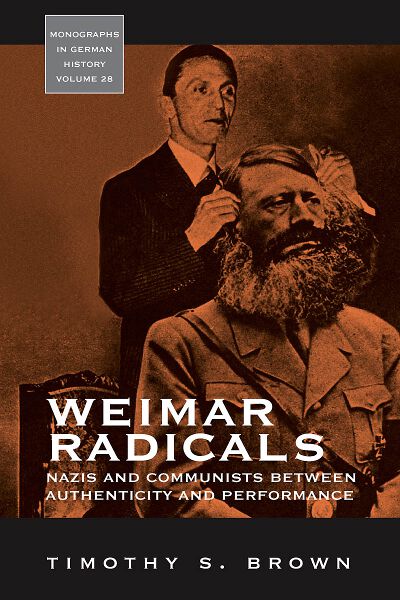 WEIMAR RADICALS
WEIMAR RADICALS
Nazis and Communists between Authenticity and Performance
Timothy S. Brown
Volume 28, Monographs in German History
“Brown’s [innovative study] makes a vital contribution to an understanding of the Weimar Republic as a set of competing political stages, where radicalism was not the direct result of social or economic circumstances, but part and parcel of a deliberate dramatization of political speech.” · German History
Exploring the gray zone of infiltration and subversion in which the Nazi and Communist parties sought to influence and undermine each other, this book offers a fresh perspective on the relationship between two defining ideologies of the twentieth century. The struggle between Fascism and Communism is situated within a broader conversation among right- and left-wing publicists, across the Youth Movement and in the “National Bolshevik” scene, thus revealing the existence of a discourse on revolutionary legitimacy fought according to a set of common assumptions about the qualities of the ideal revolutionary. Highlighting the importance of a masculine-militarist politics of youth revolt operative in both Marxist and anti-Marxist guises, Weimar Radicals forces us to re-think the fateful relationship between the two great ideological competitors of the Weimar Republic, while offering a challenging new interpretation of the distinctive radicalism of the interwar era.
Read Chapter 1. The revolt of the masses: Populist radicalism and the discontents of modernity
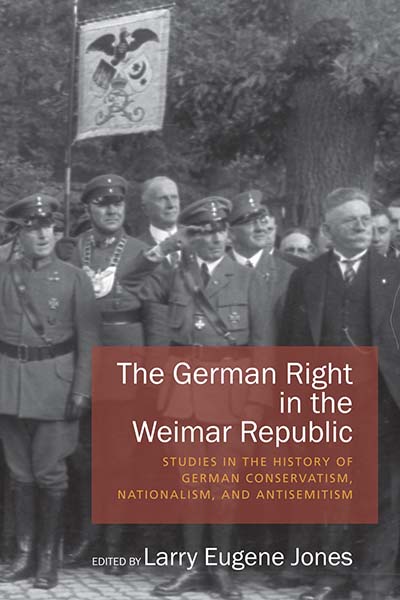 THE GERMAN RIGHT IN THE WEIMAR REPUBLIC
THE GERMAN RIGHT IN THE WEIMAR REPUBLIC
Studies in the History of German Conservatism, Nationalism, and Antisemitism
Edited by Larry Eugene Jones
“The essays, exceptionally readable throughout, enrich the contemporary debate through numerous new facets and questions. In contrast to other edited volumes, the contributions here are all based on rich source material, which results in a book that is interesting for the general historian as well as for the specialist.” · H-Soz-u-Kult
Significant recent research on the German Right between 1918 and 1933 calls into question received narratives of Weimar political history. The German Right in the Weimar Republic examines the role that the German Right played in the destabilization and overthrow of the Weimar Republic, with particular emphasis on the political and organizational history of Rightist groups as well as on the many permutations of right-wing ideology during the period. In particular, antisemitism and the so-called “Jewish Question” played a prominent role in the self-definition and politics of the right-wing groups and ideologies explored by the contributors to this volume.
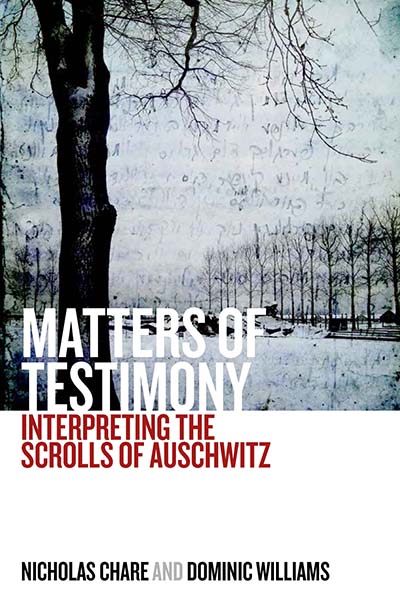 MATTERS OF TESTIMONY
MATTERS OF TESTIMONY
Interpreting the Scrolls of Auschwitz
Nicholas Chare and Dominic Williams
Check out Nicholas Chare and Dominic Williams’s piece on Slate’s The Vault and also Searching for Feelings: The Scrolls of Auschwitz and Son of Saul on the Berghahn Blog.
“This is a major book that changes the field. It is a brilliant and original work of superb historical research and profoundly affecting cultural analysis.” · Griselda Pollock, University of Leeds
In 1944, members of the Sonderkommando—the “special squads,” composed almost exclusively of Jewish prisoners, who ensured the smooth operation of the gas chambers and had firsthand knowledge of the extermination process—buried on the grounds of Auschwitz-Birkenau a series of remarkable eyewitness accounts of Nazi genocide. This careful and penetrating study examines anew these “Scrolls of Auschwitz,” which were gradually recovered, in damaged and fragmentary form, in the years following the camp’s liberation. It painstakingly reconstructs their historical context and textual content, revealing complex literary works that resist narrow moral judgment and engage difficult questions about the limits of testimony.
Read Introduction: Matters of Testimony
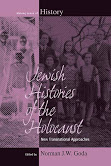 JEWISH HISTORIES OF THE HOLOCAUST
JEWISH HISTORIES OF THE HOLOCAUST
New Transnational Approaches
Edited by Norman J. W. Goda
Volume 19, Making Sense of History
“In the new history, research has been redirected from the perpetrator to the victims, and the goal is to find the authentic Jewish voice. As a consequence, personal diaries, note books, and memoirs have gained a status that traditional historians have not previously imparted to them. Good index and select bibliography. Highly Recommended.” · Choice
For many years, histories of the Holocaust focused on its perpetrators, and only recently have more scholars begun to consider in detail the experiences of victims and survivors, as well as the documents they left behind. This volume contains new research from internationally established scholars. It provides an introduction to and overview of Jewish narratives of the Holocaust. The essays include new considerations of sources ranging from diaries and oral testimony to the hidden Oyneg Shabbes archive of the Warsaw Ghetto; arguments regarding Jewish narratives and how they fit into the larger fields of Holocaust and Genocide studies; and new assessments of Jewish responses to mass murder ranging from ghetto leadership to resistance and memory.
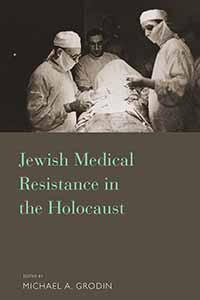 JEWISH MEDICAL RESISTANCE IN THE HOLOCAUST
JEWISH MEDICAL RESISTANCE IN THE HOLOCAUST
Edited by Michael A. Grodin
Foreword by Joseph Polak
Afterword by Yulian Rafes
“[This book] is more than simply a medical story. It is one of the most heroic and moving accounts of the Holocaust this reviewer has ever read.” · Jewish Book Council Review
Faced with infectious diseases, starvation, lack of medicines, lack of clean water, and safe sewage, Jewish physicians practiced medicine under severe conditions in the ghettos and concentration camps of the Holocaust. Despite the odds against them, physicians managed to supply public health education, enforce hygiene protocols, inspect buildings and latrines, enact quarantine, and perform triage. Many gave their lives to help fellow prisoners. Based on archival materials and featuring memoirs of Holocaust survivors, this volume offers a rich array of both tragic and inspiring studies of the sanctification of life as practiced by Jewish medical professionals. More than simply a medical story, these histories represent the finest exemplification of a humanist moral imperative during a dark hour of recent history.
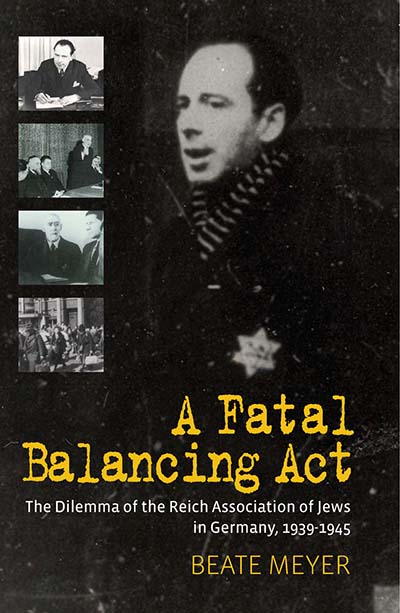 A FATAL BALANCING ACT
A FATAL BALANCING ACT
The Dilemma of the Reich Association of Jews in Germany, 1939-1945
Beate Meyer
Translated from the German by William Templer
“One of the more remarkable things about Meyer’s study is her almost total lack of criticism of the various Jewish leaders in the RJD and the RR.… Meyer sees the work of the RJD and the RR in a very different light. She argues that these Jewish leaders worked continuously through various phases of Nazi Germany’s ever-changing policies on the “Jewish Question” to find ways to ameliorate such policies…a masterful study of a phase of the Shoah that needs further exploration.” · Holocaust and Genocide Studies
In 1939 all German Jews had to become members of a newly founded Reich Association. The Jewish functionaries of this organization were faced with circumstances and events that forced them to walk a fine line between responsible action and collaboration. They had hoped to support mass emigration, mitigate the consequences of the anti-Jewish measures, and take care of the remaining community. When the Nazis forbade emigration and started mass deportations in 1941, the functionaries decided to cooperate to prevent the “worst.” In choosing to cooperate, they came into direct opposition with the interests of their members, who were then deported. In June 1943 all unprotected Jews were deported along with their representatives, and the so-called intermediaries supplied the rest of the community, which consisted of Jews living in mixed marriages. The study deals with the tasks of these men, the fate of the Jews in mixed marriages, and what happened to the survivors after the war.
Read Introduction
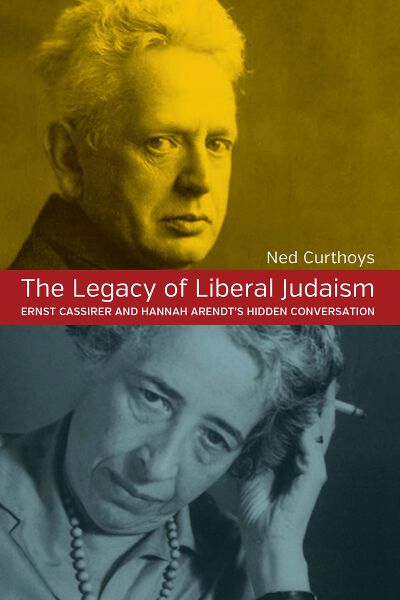 THE LEGACY OF LIBERAL JUDAISM
THE LEGACY OF LIBERAL JUDAISM
Ernst Cassirer and Hannah Arendt’s Hidden Conversation
Ned Curthoys
“…an important [book], overflowing with worthwhile ideas and based upon good reading and research… Curthoys’ main theme is succinctly expressed and painfully relevant.” · European Judaism
Comparing the liberal Jewish ethics of the German-Jewish philosophers Ernst Cassirer and Hannah Arendt, this book argues that both espoused a diasporic, worldly conception of Jewish identity that was anchored in a pluralist and politically engaged interpretation of Jewish history and an abiding interest in the complex lived reality of modern Jews. Arendt’s indebtedness to liberal Jewish thinkers such as Moses Mendelssohn, Abraham Geiger, Hermann Cohen, and Ernst Cassirer has been obscured by her modernist posture and caustic critique of the assimilationism of her German-Jewish forebears. By reorienting our conception of Arendt as a profoundly secular thinker anchored in twentieth century political debates, we are led to rethink the philosophical, political, and ethical legacy of liberal Jewish discourse.
Read Introduction
Spektrum Series: Publications of the German Studies Association
Published under the auspices of the German Studies Association, Spektrum offers current perspectives on culture, society, and political life in the German-speaking lands of central Europe—Austria, Switzerland, and the Federal Republic—from the late Middle Ages to the present day. Its titles and themes reflect the composition of the GSA and the work of its members within and across the disciplines to which they belong—literary criticism, history, cultural studies, political science, and anthropology.
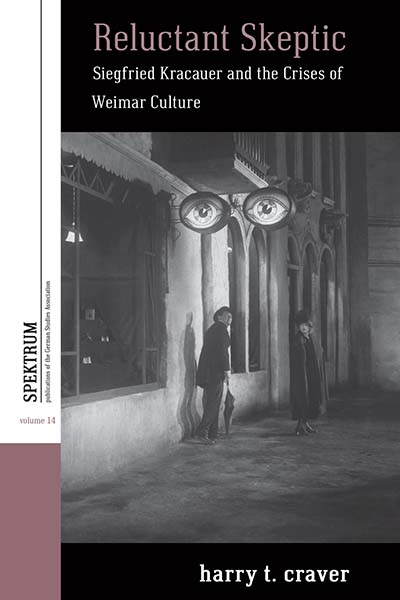 Volume 14 Forthcoming
Volume 14 Forthcoming
RELUCTANT SKEPTIC
Siegfried Kracauer and the Crises of Weimar Culture
Harry T. Craver
The journalist and critic Siegfried Kracauer is best remembered today for his investigations of film and other popular media, and for his seminal influence on Frankfurt School thinkers like Theodor Adorno. Less well known is his earlier work, which offered a seismographic reading of cultural fault lines in Weimar-era Germany, with an eye to the confrontation between religious revival and secular modernity. In this discerning study, historian Harry T. Craver reconstructs and richly contextualizes Kracauer’s early output, showing how he embodied the contradictions of modernity and identified the quasi-theological impulses underlying the cultural ferment on the 1920s.
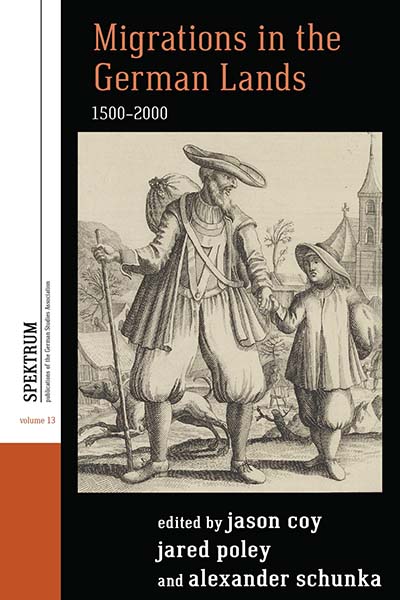 Volume 13
Volume 13
MIGRATIONS IN THE GERMAN LANDS, 1500-2000
Edited by Jason Coy, Jared Poley, and Alexander Schunka
Migration to, from, and within German-speaking lands has been a dynamic force in Central European history for centuries. Exemplifying some of the most exciting recent research on historical mobility, the essays collected here reconstruct the experiences of vagrants, laborers, religious exiles, refugees, and other migrants during the last five hundred years of German history. With diverse contributions ranging from early modern martyrdom to post–Cold War commemoration efforts, this volume identifies revealing commonalities shared by different eras while also placing the German case within the broader contexts of European and global migration.
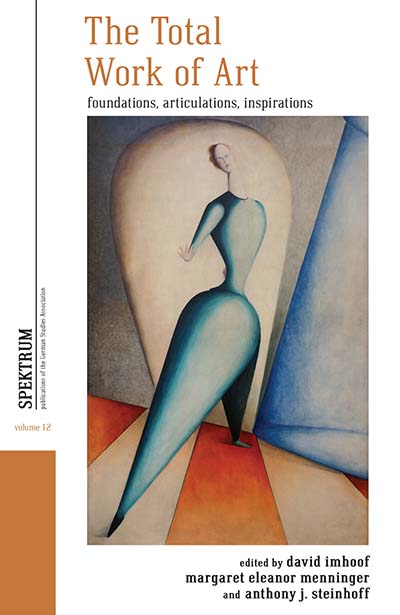 Volume 12
Volume 12
THE TOTAL WORK OF ART
Foundations, Articulations, Inspirations
Edited by David Imhoof, Margaret Eleanor Menninger, and Anthony J. Steinhoff
For two centuries, Gesamtkunstwerk—the ideal of the “total work of art”—has exerted a powerful influence over artistic discourse and practice, spurring new forms of collaboration and provoking debates over the political instrumentalization of art. Despite its popular conflation with the work of Richard Wagner, Gesamtkunstwerk’s lineage and legacies extend well beyond German Romanticism, as this wide-ranging collection demonstrates. In eleven compact chapters, scholars from a variety of disciplines trace the idea’s evolution in German-speaking Europe, from its foundations in the early nineteenth century to its manifold articulations and reimaginings in the twentieth century and beyond, providing an uncommonly broad perspective on a distinctly modern cultural form.
Read Introduction
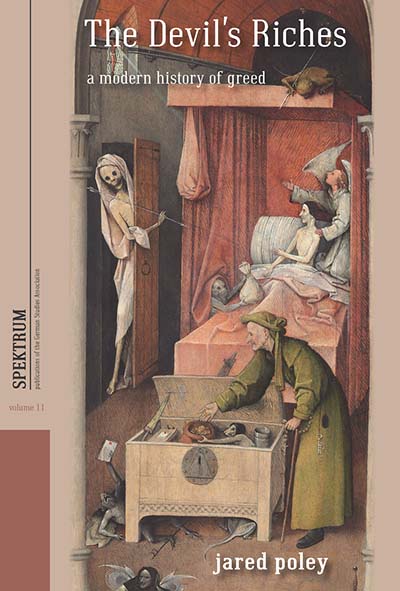 Volume 11
Volume 11
THE DEVIL’S RICHES
A Modern History of Greed
Jared Poley
“…a thought-provoking study of a subject that is too often taken for granted, rather than subjected to critical examination.” · Financial Times
A seeming constant in the history of capitalism, greed has nonetheless undergone considerable transformations over the last five hundred years. This multilayered account offers a fresh take on an old topic, arguing that greed was experienced as a moral phenomenon and deployed to make sense of an unjust world. Focusing specifically on the interrelated themes of religion, economics, and health—each of which sought to study and channel the power of financial desire—Jared Poley shows how evolving ideas about greed became formative elements of the modern experience.
Read Introduction
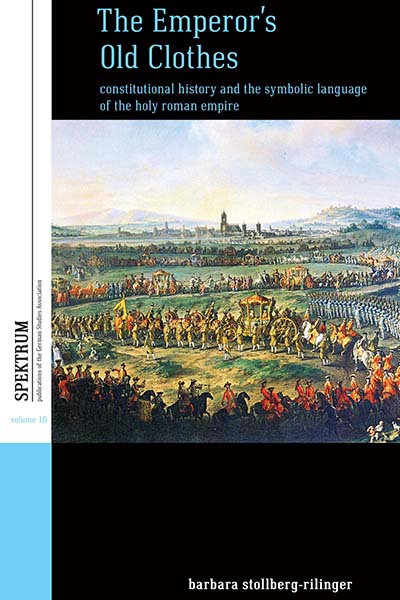 Volume 10
Volume 10
THE EMPEROR’S OLD CLOTHES
Constitutional History and the Symbolic Language of the Holy Roman Empire
Barbara Stollberg-Rilinger
Translated from the German by Thomas Dunlap
For many years, scholars struggled to write the history of the constitution and political structure of the Holy Roman Empire. This book argues that this was because the political and social order could not be understood without considering the rituals and symbols that held the Empire together. What determined the rules (and whether they were followed) depended on complex symbolic-ritual actions. By examining key moments in the political history of the Empire, the author shows that it was a vocabulary of symbols, not the actual written laws, that formed a political language indispensable in maintaining the common order.
Read Introduction
For a full list of titles in the series please visit the series webpage.
BERGHAHN JOURNALS
 Aspasia
Aspasia
The International Yearbook of Central, Eastern, and Southeastern European Women’s and Gender History
Aspasia is the international peer-reviewed annual of women’s and gender history of Central, Eastern, and Southeastern Europe (CESEE). It aims to transform European women’s and gender history by expanding comparative research on women and gender to all parts of Europe, creating a European history of women and gender that encompasses more than the traditional Western European perspective.
Featured Article:
A Woman Politician in the Cold War Balkans: From Biography to History
Krassimira Daskalova
 Contributions to the History of Concepts
Contributions to the History of Concepts
The journal serves as a platform for theoretical and methodological articles as well as empirical studies on the history of concepts and their social, political, and cultural contexts. It aims to promote the dialogue between the history of concepts and other disciplines, such as intellectual history, history of knowledge and science, linguistics, translation studies, history of political thought and discourse analysis.
Featured Article:
The Specter of Communism: Denmark, 1848
Bertel Nygaard
German Politics and Society is a peer-reviewed journal published and distributed by Berghahn Journals. It is the only American publication that explores issues in modern Germany from the combined perspectives of the social sciences, history, and cultural studies.
Featured Article:
Renaissance of the New Right in Germany? A Discussion of New Right Elements in German Right-wing Extremism Today
Samuel Salzborn
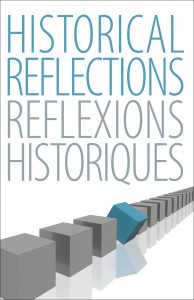 Historical Reflections/Réflexions Historiques
Historical Reflections/Réflexions Historiques
Historical Reflections/Réflexions Historiques (HRRH) has established a well-deserved reputation for publishing high quality articles of wide-ranging interest for over forty years. The journal, which publishes articles in both English and French, is committed to exploring history in an interdisciplinary framework and with a comparative focus. Historical approaches to art, literature, and the social sciences; the history of mentalities and intellectual movements; the terrain where religion and history meet: these are the subjects to which HRRH is devoted.
Featured Article:
From Holocaust Trauma to the Dirty War
Federico Finchelstein
 Journal of Educational Media, Memory, and Society
Journal of Educational Media, Memory, and Society
The Journal of Educational Media, Memory, and Society (JEMMS) explores perceptions of society as constituted and conveyed in processes of learning and educational media. The focus is on various types of texts (such as textbooks, museums, memorials, films) and their institutional, political, social, economic, and cultural contexts.
Featured Article:
“Who Wants to Be Sad Over and Over Again?” Emotion Ideologies in Contemporary German Education about the Holocaust
Lisa Jenny Krieg

